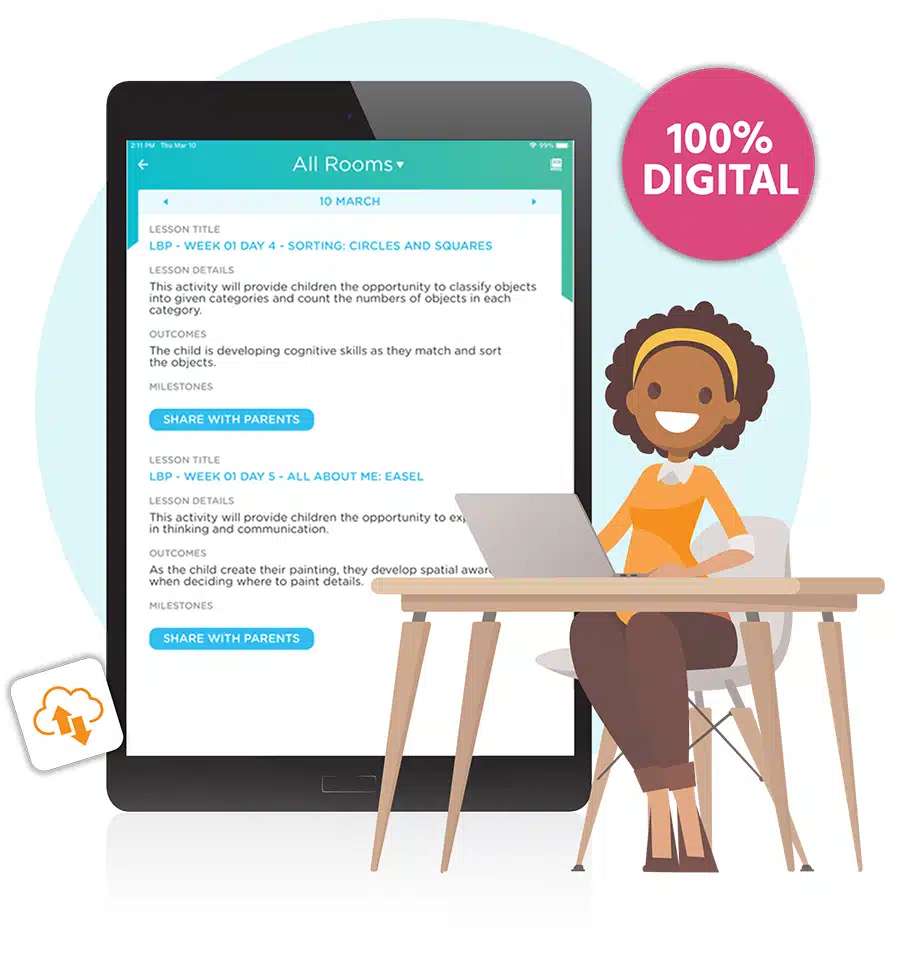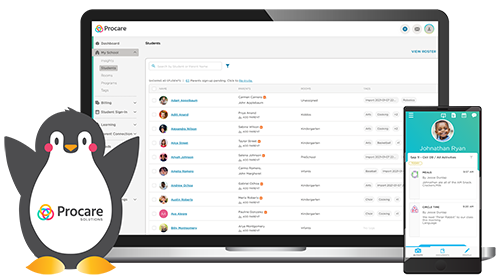
This blog was originally posted on May 11, 2021, and updated on Feb. 21, 2025, with new information.
When considering the branding of your child care business, you must think about the difference of preschool vs. daycare. Think about what name is most appropriate to convey your center’s personality, philosophy and educational approach to parents. Terms like “daycare,” “child care” and “preschool” are sometimes used interchangeably, and may not be regulated terms.
Whether you’re starting an academically focused preschool program or a daycare, it’s worth thinking about the different types of child care services and what their names represent to parents and others in your community.
Or maybe you’re a parent who’s comparing child care programs in your area and trying to choose between a daycare or a preschool program for your child. You might be wondering what the real differences are between these programs, including the services they offer and how they’re licensed in your state.
In this post, we’ll take a look at the legal and practical meaning behind terms like daycare vs. preschool, as well as other terms for child care programs that you may encounter. We’ll examine the similarities and the differences between daycare and preschool, and what you can commonly expect from each type of program.
Daycare vs. Preschool: What’s the Same?
Across the United States, there is generally no legal difference between a daycare and a preschool.
Child care programs are regulated at the state level, with laws that differentiate between home-based and center-based programs, but not between daycares and preschool programs. Both daycare and preschool programs must be licensed by state regulators, and are usually subject to the same laws and regulations for everything from director and staff qualifications to safety, nutrition, staff-to-child ratios and recordkeeping requirements. Regardless of whether a child care program is called a daycare or a preschool, it will usually need to meet standards for early childhood education.
Both preschools and daycares offer kids a place to grow, learn and play while supported by caring staff. They make safety a top concern, focusing on the well-being of each child while supporting their healthy physical, emotional and cognitive development. Generally, the focus is on kids younger than school age (with some exceptions for daycare programs). They will both provide meals, snacks, naps and outdoor play.
Given that the standards for these businesses are mostly the same, names like “daycare,” “child care” and “preschool” are usually a reflection of each early program’s mission, child care philosophy, values and how it chooses to market its services in the community.
Daycare vs. Preschool: What’s the Difference?

Understanding that a center can choose to brand their program in various ways, let’s highlight some of the key differences that commonly appear between centers that market themselves as daycare vs. preschool.
Daycare vs. Preschool: Educational Focus and Routines
Although both preschools and daycares offer education for kids, preschools tend to be the more academically focused of the two. Daycare typically has more free-play time and fewer structured activities, with more spontaneous learning opportunities.
In preschool, the emphasis will be on preparing kids to enter kindergarten, by teaching skills such as literacy and numeracy, science and art. There is likely to be a set educational curriculum based on a methodology such as Montessori, with lesson plans focused on learning outcomes and more formal educational assessments. Staff are likely to have more advanced qualifications in early childhood education.
Both daycares and preschools will teach kids important socialization and life skills, such as dressing themselves, conflict resolution and group play.
Daycare vs. Preschool: Services

Compared to preschools, daycares are more focused on giving working parents a place to leave their children during the day. They tend to have more flexible services, such as offering drop-in child care. Since they provide more routine care, they will usually provide more meals than a preschool.
While daycares may provide services like diapering, preschools generally cater to older kids and require their students to be potty-trained. Preschools are almost always center-based, while daycares may be based out of a home, and preschools also tend to be larger, with more students. Staff-to-child ratios are sometimes lower at preschools, allowing for each child to get more individualized attention.
Preschools and daycare centers both share in a dedication to safety and security for their young charges. Fee structures may be similar or preschool may be more expensive, depending on the region.
Daycare vs. Preschool: Age Requirements
Broadly speaking, daycare can have a larger age range than preschools. Daycares offer services to children from infancy up to age five and even after school programs for school age children, depending on the center and its offerings. Some daycares offer services for children as old as 12.
Normally, preschool is limited to children between the ages of three and five, although some preschools start as early as age two and some private preschools may include kindergarten. Children entering preschool will usually need to meet certain requirements such as potty training and basic language abilities.
Because of the wider age range at daycare, there is more opportunity for between-age interactions. Preschools often separate the age groups more, to allow for developmentally-appropriate learning opportunities in keeping with their set curriculum and methodology.
Daycare vs. Preschool: Operating Hours
When it comes to operating hours, the biggest difference between daycare and preschool is that preschool tends to follow a schedule similar to schools for older kids. Hours are shorter and preschools may be closed during summers, holidays and inclement weather. Preschools usually offer half-day or full-day programs, and kids may attend as little as twice per week.
Because of their focus on supporting working families, daycares will have hours as long as needed for parents to pick up their children from work. They are usually open during the summer and sometimes on weekends. Hours will be more flexible, in line with the less structured environment, allowing for the center to accommodate the child care needs of parents.
A Note about Marketing
No matter what you call your child care center, you should make sure to pay attention to naming conventions when doing any online marketing. Parents tend to search more for “daycare” than they do other terms, so it’s important to make sure you use that word prominently in order to show up higher in searches. You can find more info about search engine optimization (SEO) here.
Funding Differences Between Daycare and Preschool
The funding model greatly separates child care services like daycare from preschool programs.
Daycare Funding
Daycare funding relies heavily on private payments from families. However, options like child care subsidies, employer-sponsored care and sliding-fee scales may ease financial burdens for qualifying families.
Preschool Funding
Preschools benefit more from community and public funding initiatives. For example, Head Start programs offer free preschool services to low-income families in every U.S. state.
State-funded Pre-K initiatives provide affordable options for families, though availability may be limited. And faith-based or nonprofit preschools often provide scholarships or discounts.
Under certain circumstances, government programs like the Child Care and Development Fund, the primary federal funding source for child care subsidies to help eligible low-income working families access child care.
Daycare vs. Preschool: What’s in a Name?

Child care centers use different names to let families know what type of services they offer. The term chosen by a center for itself can indicate its emphasis on education, age group, curriculum or methodology, and more.
Of all terms, “child care” is the broadest and most neutral, covering most types of child care programs that serve kids before school age. Although “daycare” sounds similar, some child care providers consider it outdated, saying it carries negative connotations that early childhood education is just babysitting. Other providers are neutral to the term.
Words like “preschool,” “learning center,” and “early education center” signify that a center wants to be known for its academic qualifications. These centers are more likely to target older toddlers aged 3-5, and have a formal academic curriculum. “Nursery school,” on the other hand, often means a program for infants to 3 years old.
“Daycare” in the name of a center usually connotes a less structured, play-based program, without a set curriculum. “Playschool” can be a middle ground between a daycare and a more academic center, with a play-based learning curriculum.
Preschool vs. Daycare Costs
When comparing daycare vs preschool costs, keep in mind several variables, such as location, program offerings and funding availability.
Cost of Daycare
Daycare costs often vary based on the child’s age, with infant care being more expensive due to higher caregiver-to-child ratios. The average cost of child care is $400 to $1,500 per month or $100 to $350 per week for center-based daycare programs, according to trustedcare.com. The site also says that infant daycare costs $650 to $1,500 per month, while toddler programs cost $550 to $1,100 per month. Preschool programs cost $400 to $1,300 per month.
Daycares in urban areas tend to be pricier than those in rural regions.
Cost of Preschool
Preschools, especially private ones, can also be costly, but they may qualify for public subsidies or funding options if they meet specific educational standards. Publicly funded preschools are often more affordable or even free, depending on the state’s early childhood education initiatives. Basic private preschool tuition averages around $4,500 to $13,000 annually in the U.S.
Factors Influencing Both
- Location (urban vs rural)
- Age of the child (younger children typically require more resources and attention)
- Hours of care per day or week
- Additional services, such as meals, transportation or extracurricular activities.
When parents ask if preschool more expensive than daycare, the answer isn’t straightforward — it depends on the type of program and funding options available.
State-by-State Differences in Daycare and Preschool Regulations
Each state defines “daycare” and “preschool” differently, which may create confusion. Stay informed about local licensing requirements, program definitions and funding eligibility standards. Some distinctions include:
- Ratio requirements for staff-to-children vary by state (for example, infants typically require a 1:4 ratio, compared to 1:12 for older preschool children).
- Educational standards for preschools may require certified teachers or compliance with state-developed learning guidelines.
- Terminology differences may affect how you market services. For instance, some states limit the use of the term “preschool” to state-licensed educational providers only.
Understanding these nuances ensures compliance, credibility, and a leg up when interacting with parents exploring their child care options.
Factors to Consider When Choosing Child Care
Helping parents identify the right program is a collaborative process for child care providers. Here are key considerations to share with families evaluating their options.
Schedule and Availability
If parents have unconventional work hours, daycare offers greater scheduling flexibility than preschool. On the other hand, parents seeking part-day educational programs may prefer preschool’s structured calendar.
Learning Focus
Preschool programs appeal to parents prioritizing early education. Highlight that these programs help children develop academic skills and social readiness before kindergarten.
Cost and Financial Aid
Encourage parents to assess their budget and explore funding options. Walk them through local and state grant programs available for both daycare and preschool.
Social Environment
For some families, the atmosphere may matter just as much as the curriculum. Share insights about group sizes, teacher qualifications and the developmental goals emphasized by the two types of programs.
Location and Convenience
Whether choosing a daycare that doubles as workplace child care or a faith-based preschool close to home, location plays an essential role in a parent’s decision-making process.
Licensing and Accreditation
Assure families your institution meets licensing and accreditation standards, which ensure quality services and safety for their children. Accreditation from national organizations like the National Association for the Education of Young Children is particularly attractive to families.
Use a State-Aligned Curriculum to Set Your Program Apart!

The distinction between daycare and preschool is not simply semantics — it directly impacts how you run, market and grow your childcare business. Providers who can clarify these differences build trust, authority and long-term relationships.
Curriculum is one way that you can establish yourself as a preschool with high standards. With Procare Early Learning powered by Learning Beyond Paper, you have all the tools at your fingertips to provide age-appropriate curriculum. No more expensive books, binders or kits, no long hours preparing lessons and no stress for the teachers – just log in, organize pre-loaded lessons per classroom and by age group and let the learning begin.
Active learning lessons are focused on science, technology, engineering, art and mathematics. This approach to learning guides students in inquiry, dialogue and critical thinking. Daily and weekly activities, teacher materials and at-home connection materials are all included.
Ready to see how Procare can support your child care business?





